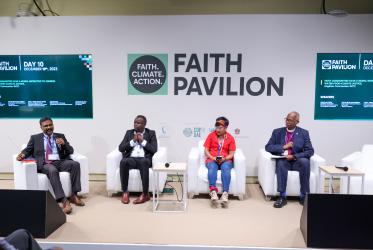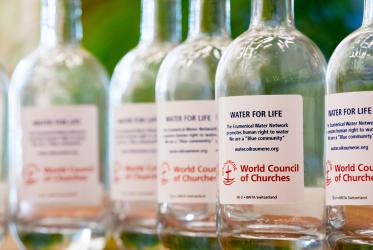Sermon by Rev. Dr Olav Fykse Tveit, general secretary, World Council of Churches
20 March 2017, The Chapel, Ecumenical Centre, Geneva
“Let justice roll down like waters, and righteousness like an ever-flowing stream.”
-Amos 5:24
Today we hear about the river of justice – the river of God. But:
What do you see and hear when you hear these words?
Hearing this verse, I see before me the tall waterfalls thundering down the cliff, and the mighty rivers ending in the majestic fjords of my home country, Norway. The last years also there the waters are coming in ways that are destructing homes and roads, as has not happened before. I see the mighty rivers in other continents, for example the Biblical river Tigris - as some of us crossed it in a visit to Iraq a month ago. Or I see the tiny little Jordan river, that has such a great symbolic role in the Biblical stories, but also today in the struggle for justice in the Holy Land. I see before me also the dry lands of the continent of Africa – which we give a focus in this Lenten campaign. O see and hear their people, animals and plants thirsting for water to come, for justice to roll down.
One of the basic lessons for us human beings is about water. When you play with it or try to swim in it as a child, you have to learn about the power in the waves and the depth of the sea, or the power in the stream of the river. You cannot cheat water. It is always showing the power of gravity, it is going downwards. Whether it rolls or flows or only drops, it will find its way.
It is time for Lent as we prepare for the celebration of Easter, commemorating the crucifixion and the resurrection of our Lord Jesus Christ, who according to St Paul’s summary of the new reality, “was handed over to death for our trespasses and was raised for our justification” (Romans 4:24-25).
It is also time for justice. It is time for water justice. It is time for us who are here and all human beings to stop resisting justice. We cannot in the long run stop justice, as we cannot stop the water.
The book of the prophet Amos is tough and rough in its description of the injustices of human beings who had been given the commandments, the practices, and the institutions to promote the good life of justice. They were even given the rituals of thanksgiving for the gifts of God and even a ritual for atonement of their sins. Still, it was necessary to say that none of this makes sense without a practice of justice that transforms the life of the poor, those who are suffering, and the practice of justice than transforms the life of those who are rich and oppressing the others.
Justice is a big word, and we might feel that it fills our mouth in a way that make us uncomfortable. Because we know there is a lot of injustice, and because we know that we are as well participating in the injustices in the world, directly or indirectly. Sometimes we might feel guilty because our many efforts for justice did not bring the results we have been working for through our programs, decades, or ecumenical initiatives. We see racism blooming – even after years of a what we saw as a successful Program to Combat Racism. All this can make us silent, or even worse: This feeling can make us give up trying to stop injustice and stop providing justice. If that happens, the prophetic words have no effect, or even a negative effect.
Sometimes we wonder why the Bible speaks so much about sin, about failures, about injustice. The Bible describes in many different ways images of how there are unavoidable negative effects of sin. God uses the realities of what we call “nature” to let us understand that there is no way to ignore the reality of judgement: “The day of the Lord is darkness, not light, as if someone fled from a lion and was met by a bear, or went into the house and rested a hand against the wall, and was bitten by a snake” (5:18f).
If our fate is given like this, the words about them can be heard as an impulse to give up. There is nothing good we can do, not even religious life can help. It can be ironic and make it look even worse. The waters will roll down anyway, and one day we will all be taken by this stream. I have often heard these words as a threat: Let justice roll down like waters. Let the ungodly and the unjust be judged. You cannot cheat water, you will be taken by it in the end.
The purpose of these words is the opposite. Those who listen to the prophetic voice are offered another opportunity. Those whom have done injustice and even exercised their religious activities to honor God in vain, even to the level of blasphemy, are told something else than that they should give up.
They are called to transformation, to transformative discipleship as pilgrims of justice and peace. They can be those who bring justice, those who let it roll down, like waters. This can happen because it is not our efforts for justice, it is God’s plan for justice.
The period of Lent is not given us to be self-critical with the purpose of being depressed and losing our energy. The period of Lent is given us to focus on what can be changed by listening carefully to the word of God. The word of God brings the clarity about injustices, but also how we are given a new opportunity to change injustices to justice. God has given that we in the death of Jesus Christ have been liberated from our trespasses as he was raised for our justification.
St Paul - as well - continues his reflection about sin by using the image of water, like the prophet Amos. Water can bring justice as a life-giving, ever-flowing stream that never dries up. In the water that bring justice – in the stream of baptism - “all of us who were baptized into Christ Jesus were baptized into his death” (Romans 6:3). We were baptized to leave the reality of sin behind us, every day. We were baptized into the ever-flowing life-giving stream of baptism, therefore “we will also live with him”, “we might no longer be enslaved to sin” (Romans 6:6).
So important is water that it can be used to describe the most significant realities of life, the truth of our lives and the truth of the potential of our lives when we see them in the light of the liberating words of God in the words of the prophet or in the apostles’ interpretation of the meaning of the death and the resurrection.
So important is water, because we cannot live without water. We cannot live without drinking clean, accessible, affordable water. We cannot be healthy without access to water to wash ourselves, our clothes, our homes. We cannot be strong to work and to love without the refreshing drops of water. Every day, many times a day, we need access to water.
This is also why it such an unacceptable injustice if human activity and structures make it impossible for other human beings to live properly from this nature we share, if the rain does not fall on everybody, or if somebody cannot live from the land on which they live or drink from the water that flows or the air they breath. In the long run, human activity cannot ignore the balances of nature. The water will flow, or roll down, even if we do not want it to, even if it will be as a judgement.
We are called to make water an issue of justice, not of injustice. We run our water campaign with the promise of God’s word: Justice will roll down like waters. We are part of God’s mission, we are in God’s river of justice and renewal.
The prophet Amos uses the image of water to say something clear and strong about the justice of God. We should promote the justice of God, it should be as natural as water, as good and life-giving as water, as healthy as water. We are given a new chance, a new opportunity, just as water comes in an ever-flowing stream, we are given a new chance.
Even if we might fail to let it roll down, there is a hope that at least God will make it happen, just as in nature. This is one of the most encouraging, motivating and hopeful verses of the Bible for the many, many people yearning for justice and recognition of their rights as human beings: “Let justice roll down like waters, and righteousness like an ever-flowing stream.” We are ourselves born again through the living water – we are in it to make justice and to make sure that new life can be born.
AMEN




